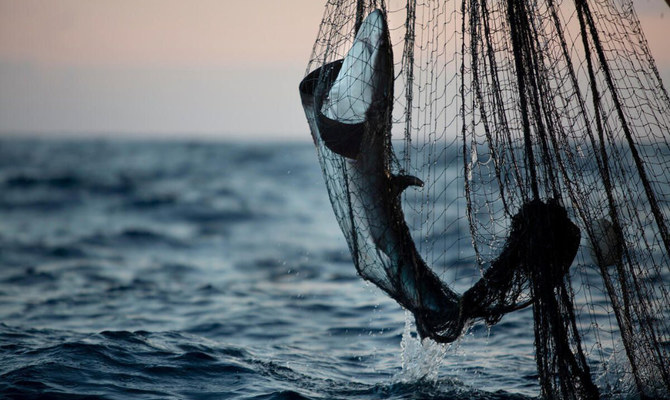Water security starts with taking care of our oceans

https://arab.news/j7wj2
The ocean is about 70 percent of the surface area of the globe. It, including its massive depths, is a huge part of the overall biosphere of the world. We, as humans, could not survive without the ocean.
The ocean is a major source of protein and nutrients for not only humans but other living creatures. Some societies depend more on the ocean’s bounty than others. China is one of the biggest users of fisheries. The EU, the US, and other major fishing fleets also play the world in search of fish. Many smaller shoreline communities depend entirely on fishing.
Many types of fish have been overfished, and their stocks have been significantly depleted. The most obvious examples are bluefin tuna and swordfish. Others include types of bass and some species of codfish. There has been much illegal, unreported, and unregulated fishing.
This type of fishing is one of the main reasons for the draining of the ocean of fish stocks that, if responsibly managed, could be in decent shape and sustainable and even regenerative. When fisheries are denuded and drained it is hard to bring them back.
However, there are examples of this being accomplished, such as the wonderful striped bass and Atlantic cod. Some major crab and clam populations have also made comebacks due to better and more sustainable management and regulations, such as the king crab off Alaska. Lobsters have made a comeback in some areas. Some lobster fisheries were at significant risk. Some of these have been rejuvenated.
Even the growing and harvesting of seaweed needs to be regulated and managed, as it is in Scotland, Japan, and parts of the US, to name a few examples. Seaweed is a source of food for many people on this planet. Japan is a notable example of this.
One of the reasons for the draining of fish stocks is the all-too-human application of what is called the tragedy of the commons. This idea started with the grazing of cattle in common spaces a long time ago. When the grazing was not regulated and managed properly the grazing area was worn out.
Fishing without regulation and management will see boats go out onto the ocean and catch as much as possible as quickly as possible. Some days it is more difficult to find fish than others. So, when the fishing is good, fleets want to get as much fish as possible.
The boat owner needs to pay off the boat mortgage. The captain and crew need to be paid. The fuel, repairs, painting, and so much more needs to be done on a fishing boat. This all takes money. And a boat owner’s way of making money is by fishing.
Unless there are constraints on fishing, then fishing will not be sustainable. This applies to the wild ocean fisheries as well as to aquaculture, a form of farming the sea in large fenced-off areas. When fishing is not sustainable people lose their livelihoods and even their culture.
The ocean is the source of trillions of dollars of global gross domestic product through fisheries, recreation, tourism, and thousands of other activities. The ocean can be a feedstock for freshwater desalination. The ocean is used to cool and run energy and other industrial plants.
Coral reefs just off the US bring in hundreds of billions of dollars in revenues. Globally, they bring in over a trillion dollars in GDP.
The ocean floor will be a gigantic source of the minerals and metals needed for energy transition and our economic future. Such mining needs to be done in sustainable and regenerative ways. There are potential environmental and economic disasters looming if the ocean is mistreated for economic means without considering the consequences that could result. Beneath the ocean floor are massive energy reserves. Care needs to be taken over how we develop these.
The oceans also help regulate the global climate and weather. The circulating deep and shallow currents in many places in the ocean determine a lot that happens in the skies, along coastlines and in deep water. Ocean currents can be thrown off by climate change not only in the Arctic and Antarctic, but also in places far from the ocean, such as the Tibetan Plateau, in southwestern China.
What happens in Greenland can affect what happens in England, West Africa, Latin America and can even have effects in places one usually would not think about when considering the melting of Greenland’s ice sheet. Climate change can become global change.
The ocean has become a big garbage bin for the world. There are even some places called ‘dumping grounds’ and ‘garbage patches’ that are truly terrifying in their awfulness and size. These massive areas — polluted with such items as plastic bottles, bags, and children's toys — are killing fish, poisoning other types of life in the seas, and are having global environmental effects.
When was the last time you walked on a beach near a city, or anywhere else that is not remote, and saw trash that has washed in from the sea, or was thoughtlessly tossed off ships, or drains out of rivers and streams from the land into the sea? Plastics, pesticides, fertilizers, heavy metals, and other chemicals and releases are truly killing the ocean and the living things within it. Remote places also have these problems, which says something disturbing about how far the dumping can go.
If the ocean keeps dying in places that means our world is also dying in places. We all are at risk, especially if the destruction of the ocean stumbles over a tipping point.
A healthy ocean means a healthy world. A sick, poisoned, overfished, and drained ocean is a bad sign for the future of humanity. However, it is not too late. The damage can be repaired, but we as a world community need to work together to bring it back.
The ocean does not follow national borders in its tidal, fisheries, and other movements. For some things there are local and national solutions, yes. But for such a majestic and key place that we know so little about global policies and cooperation are needed.
The ocean is too important to lose. Oh yes, why do I call it the ocean in the singular? We have many names for different oceans. But all oceans are connected. Look at the maps. There is much to learn about the ocean that we can apply to other aspects of our lives. Yes, we can learn from the ocean — and we should. And do we want to ruin a place that is so connected to all of us?
• Dr. Paul Sullivan is a senior research associate at KFCRIS and non-resident fellow, Global Energy Center, Atlantic Council.










































